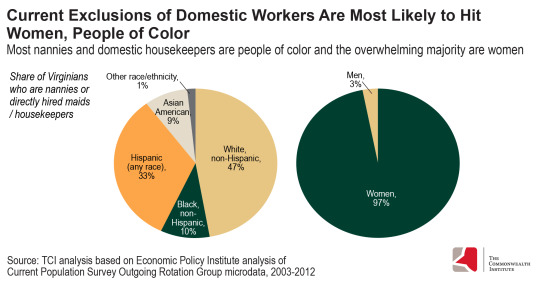January 27, 2020
Stop Excluding Domestic Workers From Minimum Wage Protections
Everyone in Virginia deserves the same basic protections against wage theft, unsafe conditions, and sub-poverty wages whether they work in a private home or a large corporation. Yet many domestic workers in Virginia are excluded from basic protections, including occupational safety and health protections, unemployment and worker’s compensation, wage and hour provisions, and protections against workplace harassment and discrimination.
The exclusion of domestic workers from basic protections did not come about by chance: it is rooted in the choices of Virginia and the United States as a whole in the early 20th century to exclude most occupations that were open to Black workers from many workplace protections. For example, Virginia has excluded many historically Black occupations from coverage in the minimum wage law. Some of the most egregious exclusions were removed by the General Assembly in 2019, yet many remain, including the exclusion of all domestic and agricultural workers from minimum wage protections. Today, many of the occupations that are still excluded from protections, including domestic workers, have a higher share of Black and Latinx working people than occupations that are provided full protections.

Legislators in Virginia have a chance to remove these exclusions this year so that domestic workers are included in basic workplace protections alongside their neighbors in other occupations. A bill in the Senate (SB 804; Sen. McClellan) would remove a number of the current exclusions that harm domestic workers by providing worker’s compensation and unemployment compensation coverage; providing protections against harassment and discrimination; removing the exclusion of domestic workers from Virginia’s minimum wage law; clarifying responsibility for payment of wages; and clarifying that the Department of Labor and Industry can set and enforce safety standards for domestic workers. In the House of Delegates, a package of bills would remove these various exclusions. This package includes HB 338 and HB 339 (Del. Price), HB 1200 (Del. Tran), and HB 1730 (Del. Gooditis).
Domestic workers do important work caring for young children and adults with disabilities. There are over 17,000 people employed in private households in Virginia as cooks, maids, nannies, butlers, and outside workers such as gardeners, caretakers, and other maintenance workers. There are also about 7,000 non-agency direct care aides in Virginia. And there are additional workers in other industry categories who may be currently left out of minimum wage protections by Virginia’s domestic worker exclusion.
All told, there are about 60,000 in-home workers in Virginia according to unpublished estimates of 2018 data by the Economic Policy Institute. And typical wages for in-home workers were low: the national median hourly wage of in-home workers was just $10.90 in 2018, which was more than 40% below the national median hourly wage of other workers.
A large majority of in-home workers in Virginia are women, and many are people of color, according to a published 2013 study by the Economic Policy Institute.
- 99% of nannies, 93% of maids and other house cleaners not hired through agencies, and 86% of non-agency direct-care aides in Virginia are women.
- 42% of nannies, 70% of non-agency maids and other house cleaners, and 36% of non-agency direct-care aides in Virginia are people of color.
Domestic workers do incredibly important work that can be both physically and emotionally demanding. Federal law includes domestic workers in the federal minimum wage. Virginia should treat all working people with dignity and remove exclusions of domestic workers from key state-based labor protections.
Category:
Economic Opportunity
